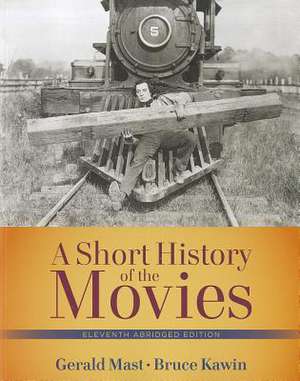A Short History of the Movies
Autor Gerald Mast, Bruce F. Kawinen Limba Engleză Paperback – 30 sep 2011
Preț: 503.52 lei
Preț vechi: 621.63 lei
-19% Nou
Puncte Express: 755
Preț estimativ în valută:
96.35€ • 103.03$ • 80.33£
96.35€ • 103.03$ • 80.33£
Carte indisponibilă temporar
Doresc să fiu notificat când acest titlu va fi disponibil:
Se trimite...
Preluare comenzi: 021 569.72.76
Specificații
ISBN-13: 9780205210626
ISBN-10: 0205210627
Pagini: 465
Dimensiuni: 185 x 231 x 25 mm
Greutate: 0.79 kg
Ediția:Abridged.
Editura: Longman Publishing Group
ISBN-10: 0205210627
Pagini: 465
Dimensiuni: 185 x 231 x 25 mm
Greutate: 0.79 kg
Ediția:Abridged.
Editura: Longman Publishing Group
Cuprins
1. Introductory Assumptions. 2. Birth. Frames per second. Pictures on Film. Speed. Flicker and the Continuous Signal. Persistence of Vision and Other Phenomena. Seeing with the Brain. Visual Masking and Retinal Retention. Scientific Toys. Emile Reynaud. Photography. Muybridge and Marey. Thomas Edison. W. K-L. Dickson and William Heise. Early Cameras and Films. The Kinetoscope. A Sound Film and Studio. Projection. The Magic Lantern. The Loop and Other Solutions. The Lumiere Brothers. R.W. Paul. The Vitascope. The First Films. 3. Film Narrative, Commercial Expansion. Early Companies. Narrative. George Melies. Cohl and Others. Edwin S. Porter. From Brighton to Biograph. Complexity in Early Film Business Wars. The Film d'Art. 4. Griffith. Apprenticeship. Biograph: The One-Reelers. Two Reels and Up. The Birth of a Nation. Intolerance. 1917-31. Broken Blossoms and Way Down East. The Struggle. 5. Mack Sennett and the Chaplin Shorts. Krazy Keystones. Charlie. 6. Movie Czars and Movie Stars. Stars over Hollywood. The First Stars. California, Here We Come. The Emperors and Their Rule. Major Studios. Movie Palaces. Morality. Films and Filmmakers, 1910-28. Thomas Ince. Douglas Fairbanks. DeMille and von Stroheim. Greed. Henry King. Oscar Micheaux and the Race Movie. Webber and Watson. Weber and Women. King Vidor. Lubitsch and Others. Flaherty and the Silent Documentary. The Comics. Laurel and Hardy and Hal Roach. Harold Lloyd. Harry Langdon. Buster Keaton. The Gold Rush and The General. Hollywood and the Jazz Age. Modernism. Jazz, Booze, and It. 7. The German Golden Age. Expressionism, Realism, and the Studio Film. Fantasy. Caligari. Metropolis. Nosferatu. Psychology. The Last Laugh. Pabst and die neue Sachlichkeit. The End of an Era. Beyond the Studio. Exodus to Hollywood. Using Sound. Lei Riefenstahl. 8. Soviet Montage. The Kuleshov Workshop. Sergei M. Eisenstein. Battleship Potemkin. October. Sound and Color. Vsevolod I. Pudovkin. Mother. Later Works. Other Major Figures. Alexander Dovzhenko. Dziga Vertov. Socialist Realism. 9. Sound. Processes. Problems. Solutions. 10. France between the Wars. Surrealism and Other Movements. Gance and Dreyer. Abel Gance. The Passion of Joan of Arc. Rene Clair. Jean Renoir. Grand Illusion. The Rules of the Game. Vigo and Others. Jean Vigo. Carne and Prevert. 11. The American Studio Years: 1930-45. Film Cycles and Cinematic Conventions. The Production Code. Cycles. Studios and Style. Women in the Studio Era The Comics. Late Chaplin. Disney's World. Lubitsch and Sound. Frank Capra. Preston Sturges. George Cukor. The Marx Brothers. Mae West. W.C. Fields. Masters of Mood and Action. Josef von Sternberg. John Ford. Howard Hawks. Alfred Hitchcock. Orson Welles. 12. Hollywood in Transition: 1946-65. Enemies Within: Freedom of Association and Free Entertainment. The Hollywood Ten and the Blacklist. 3-D, CinemaScope, Color, and the Tube. Films in the Transitional Era. Freedom of Speech, Preminger, and the End of the Blacklist. Message Pictures: Kazan and Others. Adaptations and Values: John Huston and Others. Film Noir and Other Genres. The Freed Musicals. Surfaces and Subversion. Samuel Fuller . Late Hitchcock. Nicholas Ray. Late Ford. Douglas Sirk. Finding the Audience. 13. Neorealism, New Wave, and What Followed. Italian Neorealism. Roberto Rossellini. De Sica and Zavattini. Luchino Visconti. Romantics and Antiromantics. Federico Fellini. Michelangelo Antonioni. Pasolini and Bertolucci. Germi, Leone, and Others. France---Postwar Classicism. Cocteau and Others. Max Ophuls. Robert Bresson. Tati, Clouzot, and Others. 1959 and After. The New Wave. Francois Truffaut. Jean-Luc Godard. Alain Resnais. Chabrol, Rohmer, and Rivette. Varda, Marker, and the Documentary. Malle and Others. 14. National Cinemas: 1945-. Sweden and Denmark. Ingmar Bergman. England. Postwar Masters. Another New Wave. Loach, Leigh, and Others Central and Eastern Europe. The Czech Golden Age. Poland. Hungary. The Balkan States. Asia Japan. India. China. Taiwan. Hong Kong. Korea. 15. Hollywood Renaissance: 1964-76. American Auteurs. John Cassavetes. Woody Allen. Robert Altman. Francis Ford Coppola. Martin Scorsese. Malick, De Palma, and Others. Stanley Kubrick. The Independent American Cinema. Early History. Film Poets. 16. National Cinemas 2: 1968-. Das neue Kino. Rainer Werner Fassbinder. Werner Herzog. Wim Wenders. Von Trotta and Others. Third World Cinemas. Emerging Cinemas, Emerging Concerns. Instructive Dramas. Documentaries. Gutierrez Alea and Sembene. Other English-Language Cinemas. Australia. New Zealand. Canada. Ireland and Elsewhere. Russia and the Former Soviet Union. Paradjanov, Tarkovsky, and Others. Glassnost and After. Iran. The New Internationalism. Luis Bunuel and Spain. 17. The Return of the Myths: 1977-. Star Wars and the New Mythology. Superheroes, Slashers, and Cops. Myth and Antimyth. Popular Heroes and Postmodern Irony. Leading Directors. Lucas and Spielberg. David Lynch. Jim Jarmusch John Waters Joel and Ethan Coen Jonathan Demme Terry Gilliam Carl Reiner and Others Robert Zemeckis. Tim Burton Oliver Stone Quentin Tarantino Robert Rodriguez John Sayles Charles Burnett Spike Lee Luis Valdez Gus Van Sant Julie Taymor and Others. Ridley Scott and Others. Christopher Nolan and Others. 18. Conglomerates and Video: 1975-. It's A Wonderful Deal. Sequels and Blockbusters. Conglomerates. For Sale: Studio. The Budget Explosion. Executive Decisions. Theatres. Studio Shake-ups. Movies in the Age of Video. Analog and Digital Information. Sampling and Conversion. Videotape Recorders, Cassettes, and Discs. DVDs. Out of the Vaults. Pixels and Lines. Film and Video Frames. Changes on the Set. Nonlinear Editing. Copies and Originals. Colorization. Electronic Cinema. 19. Digital Cinema: 1999-. Doing without Film. Beginnings. Production and Distribution. The Look of the Future. Glossary. Acknowledgments. Index.
